| Except for monthly Vital Conversations convened by David Nelson, CRES programs arise by request. Our management principle is "management by opportunity." Every year we are delighted by the number of opportunties given to us, as our yearly program pages demonstrate. (Of course we also provide free private consulation to organizations and other services as requested, not listed on our public website.) |
This page is continuously updated. Events listed by date, earlist first
 Vern's lecture notes on worship and worship styles in world religions are here. Vern's lengthy notes on his own approach and experience with worship are here. #250111McCoy Mary McCoy Autographs Her Book on Ethics For CRES archives, Mary Gibson McCoy signs a copy of her 2021 book, Ethics without Scripture: Creating a Code of Conscience, here with husband Greg and Vern, outside the Truman Forum at the Plaza Branch of the KC Public Library January 11 where she had arranged a program for young people and adult guides on "Youth Violence." 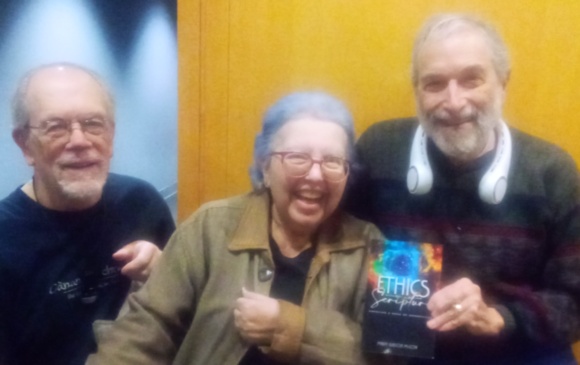 The Rev Mary Gibson McCoy focuses on multicultural and interfaith education and relations, following a career as a real estate attorney with 30 years of experience in title underwriting. She served as an At-Large Director (and former Chair) of the Greater Kansas City Interfaith Council, Founder and President of Cultural Crossroads, Inc. She is an ordained minister of the Alliance of Divine Love and past president of the Heartland Chapter of the Alliance of Divine Love. She was also a member of the Religious Literacy Project task force and organized and created the The Human Spirit collection at the Plaza Library (photo and story) and the Kansas City Coalition Against Hate Crimes. As president of the Heartland Chapter, she arranged to continue the annual Interfaith Thanksgiving Dinner after CRES planned to retire it as a CRES program after 25 years in 2009; and she created "The Vern Barnet Interfaith Service Award," which was given to her and her husband, the Rev. Gregory L. McCoy, in 2023. As President of Cultural Crossroads, she writes for the “Cultural Crossroads KC” blog devoted to cultural issues. The "Balance Beams" blog is a personal blog, designed to highlight her personal values and issues. She has also written the book, Ethics Without Scripture: Creating a Code of Conscience (photo above), and is presently working on Your Day, Your Way, which uses her 1996 marriage to Gregory L. McCoy, as an example of an unusual wedding. She was formerly the founder and artistic director of IDIMO Dancers/DanceAmerica, a performing international dance troupe, and was a teacher and co-director of a community-based ethnic dance organization, as well as a past member/performer with numerous ethnic dance groups and served as director and officer of various professional associations during her real estate career (First VP and chair of various committees of Women’s Chamber of Commerce; First VP and Director of Rural Northland Development Association; committee chair of Kansas City Metropolitan Bar Association; committee chair of Platte County Bar Association; and Social Director of the Arab-American Friendship Club). #MLK  King Holiday Essay — 2025 January 16 Download a PDF of Vern's 2-page summary of the genius of the spiritual approach of Martin Luther King Jr by clicking this link. You can also read the Letter from a Birmingham Jail here. Bill Tammeus writes about King's visits to Kansas City here. Vern writes:
I remember meeting King in a church basement in
Washington, DC, the year before he was assassinated. I remember his
appearance was delayed quite a while as his team checked the church for
threats and dangers, as those of us gathered to hear him hoped to see
him alive. It was a dark time. I remember his brilliant analysis of
Vietnam, and particularly its effect on young Black men. #ThurmanInBrooks I was a student at the University of Chicago Divinity School when he was assassinated. The next Sunday was Palm Sunday, April 7, and I was to be a guest preacher. I remember struggling to find something uplifting to say, and I was thankful to be able to rely on King's teachings and his public ministry in the context of the Christian story. I used a recording of the April 3 "Mountain Top" speech in many sermons in the following months. I remember studying the writings and speeches of King, with their eloquence and depth. Each year I continue to reread the Letter from the Birmingham Jail, which every year renews me with astonishment. I also especially cherish his last sermon, March 31, at the Washington National Cathedral, a few days before his assassination. And I claim King also as an exemplar of interfaith respect, which is why I wrote this essay. In a NYTimes column, David Brooks discusses Robert Thuman's summary of the principles of non-violence. (We can add that it was in meeting Thuman that Gandhi said, “It may be through the Negroes that the unadulterated message of nonviolence [Gandhi's satyagrapha, or 'Truth-force'] will be delivered to the world.” Later King went to India himself, and kept a photo of Gandhi above his desk.) Here is a passage from Brooks which includes the summary: To be a good citizen, it is necessary to be warmhearted, but it is also necessary to master the disciplines, methods and techniques required to live well together: how to listen well, how to ask for and offer forgiveness, how not to misunderstand one another, how to converse in a way that reduces inequalities of respect. In a society with so much loneliness and distrust, we are failing at these social and moral disciplines. #IFHarmony February 1-7   To observe World Interfaith Harmony week, we offer one of our most cited essays, "Stealing Another's Faith." The question of honoring without misappropriating material from others is not so easy, and this essay raises awareness so faiths can be less in conflict and more in harmony. Read, download this PDF, and share this important essay by Vern -- with excerpts from Huston Smith and Harvey Cox. #BrooksVideoBHM BLACK HISTORY MONTH A Video with Alvin Brooks -- 2 min 31 sec #EIHKC update The Ecumenical and Interfaith History of Greater Kansas City  This valuable resource for understanding interfaith work in Kansas City, linked from the CRES home page (right column) and directly available here is now also available to researchers throughout the world through the ProQuest academic library database. Our former intern, Geneva Blackmer, prepared the history. The History includes both text and video. The website includes a page inviting additional contributions to further detail this critical, but often overlooked, dimension of religious and civic life in our region. #250214 Valentine's Day Weddings 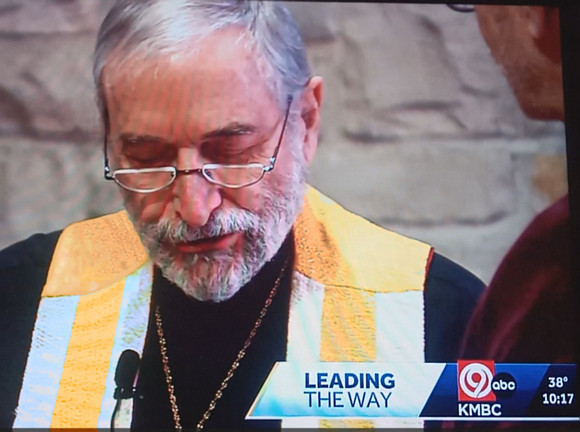 KMBZ featured Kansas City's Pilgrim Chapel on Valentine's Day where Vern performed a vow renewal ceremony and three "elopements," all very brief . . . and all without charge. You can see one version of the TV report here: https://www.pilgrimcenterkc.org/valentines-day. #250409 Alvin Brooks Receives Collaborator Award 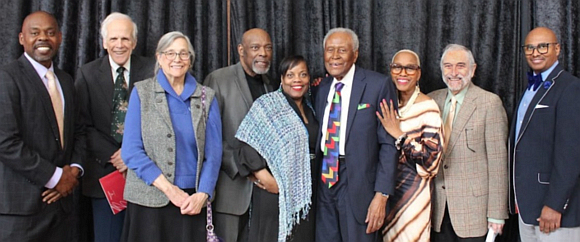 One of the many honors Al Brooks continues to receive for his life devoted to the community was the Junior League's Branton/Hall Community Collaborator Award, 2025 April 9, at a huge luncheon in Union Station's Grand Plaza. The award ceremony was the center of a day-long series of trainings and educational opportunities. After the presentation, the camera caught Al and some family and friends congratulating him. Vern, you'll remember, was the developmental editor for Al's memoir, Binding Us Together: A Civil Rights Activist Reflects on a Lifetime of Community and Public Service. CRES applauds the 2025 Greater KC Interfaith Council's annual Table of Faiths event - honoring our friend of many years, the Rev Mary Gibson McCoy with the Steve Jeffers Leadership Award, and the annual Table of Faiths Award to the KC Harvesters organization. April 3 Thursday 7-9 pm, Center for Spiritual Living, 1014 W 39, KCMO Tickets from $10 for students: https://kcinterfaith.org/2025-table-of-faiths/ 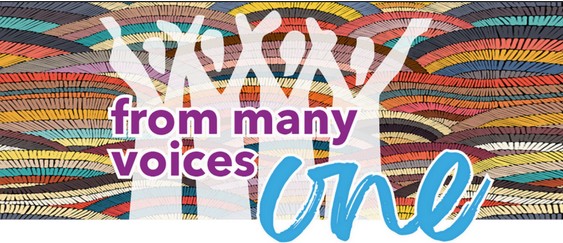 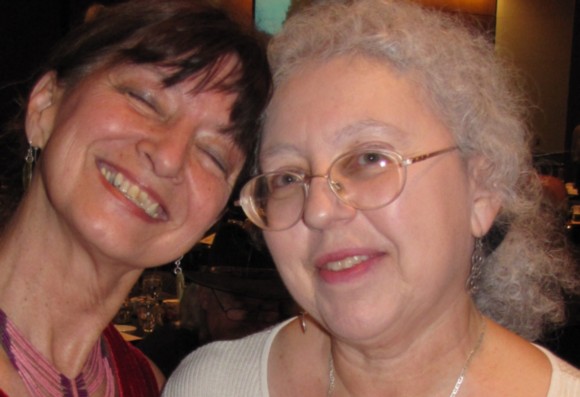 Kara
Hawkins and Mary McCoy in 2010 at the first Interfaith Thanksgiving
gathering Mary organized in 2010. Alas, Mary was unable to attend this
2025 Table of Faiths event, but the award was accepted on her behalf.
For more photos and a bio of Mary, visit here. Kara
Hawkins and Mary McCoy in 2010 at the first Interfaith Thanksgiving
gathering Mary organized in 2010. Alas, Mary was unable to attend this
2025 Table of Faiths event, but the award was accepted on her behalf.
For more photos and a bio of Mary, visit here. The evening included presentations from musical groups and others from various faith communities; informational faith tables; refreshment reception, hors d'oeuvres and deserts. A BRIEF HISTORY OF THE Table of Faiths EARLY YEARS -- #CouncilPhoto1989_____________________________________________________________The first Table of Faiths event, with David Nelson as convener, was a luncheon at the Marriott Muehlebach Hotel downtown Nov 10, 2005. Alvin Brooks, one of the co-chairs (Gayle Krigel, Mahnaz Shabbir, and Chuck Stanford), welcomed guests. Mayor Kay Barnes was the keynote speaker and presented the first Table of Faiths Award to Vern Barnet. The second Table of Faiths luncheon, Nov 14, 2006, honored Don and Adel Hall and Ed Chasteen. The third Table of Faiths luncheon, Nov 7, 2007, honored Alvin L Brooks and The Kansas City Star. The fourth Table of Faiths luncheon, Nov 13, 2008, included a presentation of Donna Ziegenhorn's play, The Hindu and the Cowboy. Honored were Robert Lee Hill and the Shawnee Mission Medical Center, and Steve Jeffers (1948-2008) was lovingly remembered. The fifth Table of Faiths luncheon, Nov 12, 2009, introduced The Steve Jeffers Leadership Award, given to Ahmed El-Sherif. All Souls Unitarian Church was also recognized, and Allan Abrams (1939-2009) was lovingly remembered. The sixth Table of Faiths luncheon, Nov 11, 2010, honored Notre Dame de Sion High School with the Table of Faiths Award and Queen Mother Maxie McFarlane with the Steve Jeffers Leadership Award. The seventh Table of Faiths luncheon, Nov 10, 2011 honored the Kansas City Public Library with the Table of Faiths Award and Donna Ziegenhorn with the Steve Jeffers Leadership Award. The eighth and last Table of Faiths luncheon, Nov 8, 2012, presented the theme of "Spirituality and the Environment: Caring for the Earth, Our Legacy." The Steve Jeffers Leadership Award was given to Mayor Sly James and the Table of Faiths Award went to Unity Church of Overland Park. There was no Table of Faiths event in 2013. Beginning in 2014, Table of Faiths events were no longer major downtown civic luncheons involving elected, cultural, and business leaders. With a longer evening format, the first in the new Table of Faiths dinners was held May 8, 2014, at Unity Village. --CRES ARCHIVES Vern Barnet founded the Council
in 1989 as a program of CRES and is Council Convener Emeritus. The Council newsletter has
published his brief notes about three
milestones in the early history of the Council.
#NYTimes1988  #250404 As
long as the Kansas City Interfaith Council was a program of CRES,
and for years after, I carefully avoided identifying my own religious
affiliations. More recently, while always encouraging everyone to find
one's own ways of relating to the mysteries of existence -- through
art, personal relationships, social work, and/or organized religion --
and many other ways, I've become freer on occasion to share some aspect
of my own path since folks know I am not trying to present my own
practice as a model for anyone else. So if you want a peek at my
practice, here is my Lenten submission for my church. Seven of us were
asked to write in this series. --Vern 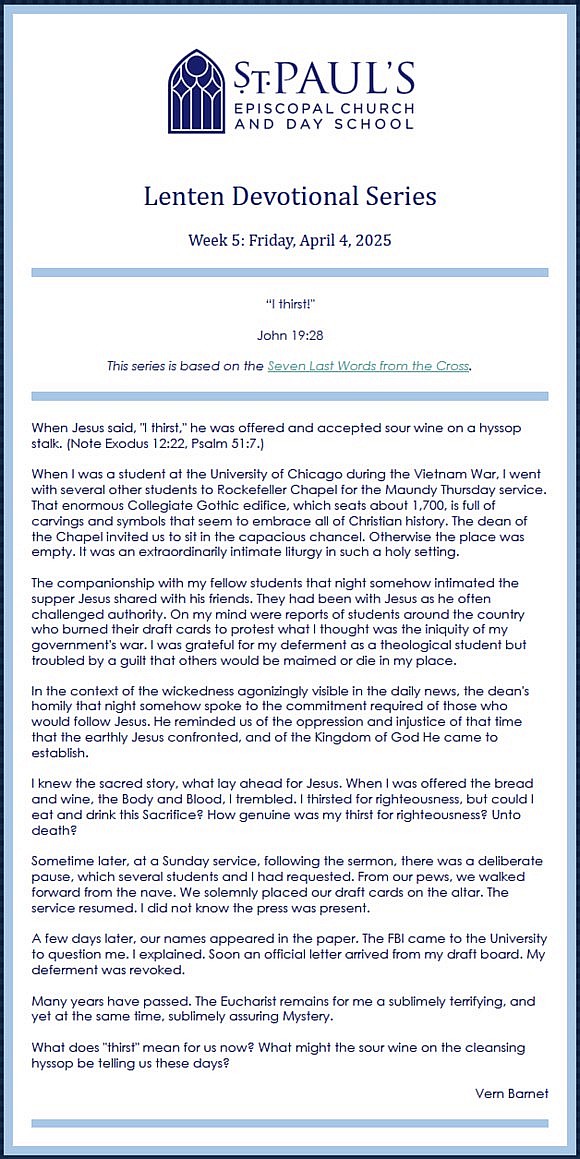 SEVEN DAYS #SevenDays2024   The themes help us focus on kindness in seven different ways, on seven different days. LOVE DISCOVER OTHERS CONNECT YOU GO ONWARD The SevenDays website gives you the SevenDays story (with the horrific past on April 14, 2014), the present, and the future, the
SevenDays events this year, how to get involved, resources, and an
opportunity to shop and various sponsorship opportunities.  CRES
is glad to have been involved from the very first year with an
interfaith panel, and admires the folks and the organization involved
for turning tragedy into continuing community benefit by advancing
understanding and relationships. Al's 93rd Birthday at the Rockhurst University Alvin Brooks Center for Faith-Justice 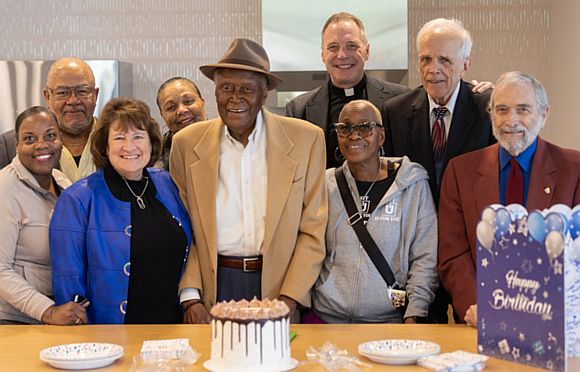 It
was a day early, but Rockhurst University President Sandra Cassady
(wearing blue) gathered Al and a few of Al's countless admirers to
tour the Alvin Brooks Center for Faith-Justice, with construction nearing completion. It is scheduled to open to the public this fall. (Vern, you'll remember, was the developmental editor for Al's memoir, Binding Us Together: A Civil Rights Activist Reflects on a Lifetime of Community and Public Service.) 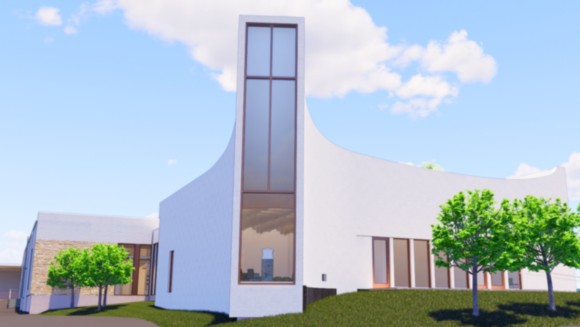 In a statement, Dr Cassady said, "The building honors Alvin Brooks, longtime Kansas City leader in social justice and civil rights. Brooks has lived most his life serving Kansas City through his time spent as a police officer, working for the public schools, and being on the Kansas City Council. It is a legacy of servant leadership that deserves recognition." 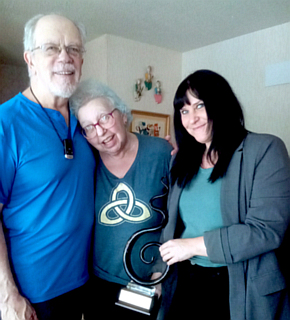 Because of health, the Rev Mary Gibson McCoy, was unable to attend this year's Table of Faiths event April 3 where she was honored with the the Steve Jeffers Leadership Award. This May, when our amazing former CRES intern was back from her time as research assistant at the University of Bonn, she and Vern visited Mary and Greg, shown here with the spiraling award. Because of health, the Rev Mary Gibson McCoy, was unable to attend this year's Table of Faiths event April 3 where she was honored with the the Steve Jeffers Leadership Award. This May, when our amazing former CRES intern was back from her time as research assistant at the University of Bonn, she and Vern visited Mary and Greg, shown here with the spiraling award. Mary is a former Chair of the Greater Kansas City Interfaith Council and Founder and President of Cultural Crossroads, Inc. Among her many gifts to the city is The Human Spirit collection at the Plaza Library which she created. She instigated the annual "Vern Barnet Interfaith Service Award." She and CRES have worked closely for many years to promote interfaith understanding. For a more complete biographical sketch, please visit this link which shows her with her book, Ethics without Scripture: Creating a Code of Conscience.
Vern offers his conclusions from over 50 years of experience and
study: in a troubled world, what paths lie forward? and how can one
dare offer praise for the intertwined mix of the horror and the beauty
of existence? * Doing theology is less like mathematics and more like expounding why you love someone. 'Pride' at Westport Presbyterian 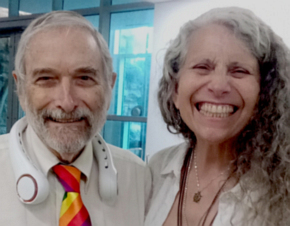 Jennifer White invited Vern to speak on the last Sunday of Pride Month for a Sunday potluck at the Westport Presbyterian Church. Vern began, of course, with a quiz about same-sex relationships that appeared in one of his weekly Kansas City Star columns, June 9, 1999. Even many of the well-informed guests were surprised by some of the questions and answers. Then after reading a 2007 column for Valentine's Day about love which did not mention sexuality, Vern told about an angry father who called Vern to complain. This led to a confession by the father that he had just thrown his son out of the house because his son told him he was gay. Eventually, with several calls, the father asked his son to return home -- with his boyfriend -- and had a spiritual experience seeing them together that transformed his Fundamentalist religious perspective into a fuller understanding of God's love. #July4 Independence Day readings * Vern Barnet directly below on Sacred Citizenshi * Frederick Douglass second below * A 2024 Episcopalian perspective: Fr John Spicer here * A perspective on what makes America great by a President leaving office here * Ken Burns on American history here
--------------
2025 July 16 Wednesday 12 noon CDT Zoom The Clinician as Contemplative: Inner Formation for Outer Compassion 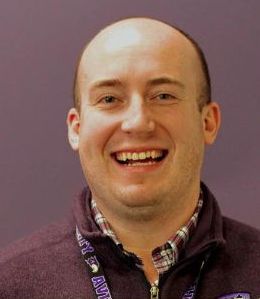 This session with our friend, Dr. Joshua R. Paszkiewicz,
explores how inner spiritual formation—including contemplative
practice—can deepen a clinician’s presence, resilience, and ethical
attunement in healthcare and caregiving settings. This session with our friend, Dr. Joshua R. Paszkiewicz,
explores how inner spiritual formation—including contemplative
practice—can deepen a clinician’s presence, resilience, and ethical
attunement in healthcare and caregiving settings. Rather than separating spiritual life from professional practice, participants will be invited to reimagine their caregiving role as a form of contemplative vocation. Drawing from Zen Buddhism, Catholic mysticism, and psychodynamic reflection, the workshop encourages healthcare professionals, chaplains, and students to cultivate spaciousness, attentiveness, and compassion amidst the pressures of modern care systems. Objectives: 1. Define "contemplative presence" and distinguish itRegister here: https://us02web.zoom.us/meeting/register/1iQ5NRwoTvGBKDrpyGYAsw Event by The Interfaith Center at Miami University, funded by a grant from Interfaith America #250718 David Nelson on Appreciative Inquiry 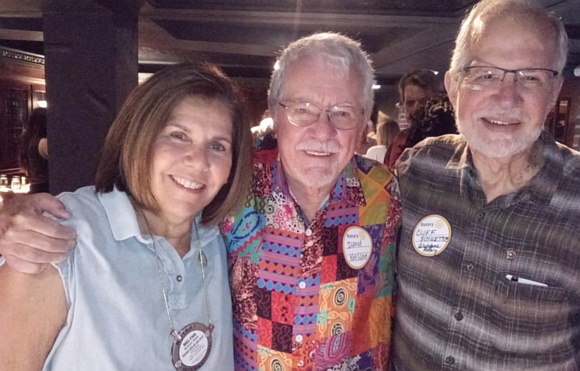 Among the many areas of David's expertise and experience, "Appreciative Inquiry" was his choice of topic to share with the Plaza Rotary Club July 18. After the meeting, Melynn Sight, the Club member who invited David (in the middle) and Cliff Schuette, visiting president from the Gladstone Club, consented to a photo. In addition to his talk, David provided a card with the Eight Assumptions of Appreciative Inquiry (see below) and a key statement: "The human family in its delightful diversity shares a common creation and a common hope for community. In times of division and war, as we take in all that is happening in the world, we are tempted to retreat into our own safe tribes and families and yet our hearts long for a wider reach and a more inclusive sharing. Deep listening and strong sharing can allow us to find hope within our diverse paths and our individuals pains. As we listen to understand and share to be heard and understood, something special can happen. We together find strength to hope, ideas for action, and courage to stay human.If you have never heard David tell the story of Marvin and Lincoln, which so powerfully illustrates the difference Appreciative Inquiry makes in people's lives, you might consider asking him to speak to your group. For now, you can enjoy reviewing
This is the first public program David has provided since his stroke in March. We are grateful he remains so effective in connecting with his audience and presenting his material, even with some impairment which only those who know David might notice. He continues to improve and has recently met with local government officials in planning programming for next year. David has also resumed leading twice-monthly "Morning Prayer" over Zoom. The Vital Conversation series, begun in 2002, has ended. Because the material David prepared for the series remains so valuable, we retain it on the CRES website. Dr. David Nelson is president of The Human Agenda and senior associate minister with CRES. A prominent interfaith leader, David was one of twelve original faith members of the Greater Kansas City Interfaith Council in 1989 and served as Convenor for three years. He is senior associate minister of CRES, the World Faiths CENTER FOR RELIGIOUS EXPERIENCE AND STUDY, was a major force in the 2001 Gifts of Pluralism conference where he introduced Appreciative Inquiry, played a key role in Kansas City’s first anniversary observance of 9/11, and lectured at the nation’s first Interfaith Academies in 2007. David served two years as the coordinator of the Christian Jewish Muslim Dialogue Group. He served in the Life Connections Interfaith Program at the US Penitentiary in Leavenworth for over a decade. As an Appreciative Inquiry Coach, David has assisted individuals and groups in a variety of settings. These included the Department of Health and Human Services, Emergency Medicine, Head Start, and Community Action Agencies. He has provided training in Team Building and Appreciative Supervision in 39 states and Europe.David received his bachelor’s degree in history and political science from Bethany College in Lindsborg, Kansas. His master’s degree in divinity, and his doctorate in ministry are both from the Lutheran School of Theology at Chicago. He has served as an adjunct faculty member of that school, conveying a Doctor of Ministry program in Kansas and Missouri. He also is a graduate of the two-year program in spiritual direction with the Shalem Institute for Spiritual Direction in Washington, DC. David served as Senior Pastor at Saint James Lutheran Church in Kansas City for 13 years. He also served Peace Lutheran Church in Manhattan, Kansas, and at Andover Lutheran in Windom, Kansas, five years each. David’s awards include the 2022 Steve Jeffers Leadership Service Award, a CRES Award in 2006 “for life-long community service, vision, and care for the future, and blessing the venture of interfaith understanding,” the 2013 Buck O’Neil Legacy Seat Award at the Kansas City Royals where David was applauded at a game of the Kansas City Royals at Kauffman Stadium for embodying Buck’s values (including diversity and working to make the world a better place), a Special Commemoration by the Interfaith Council when he retired from the Council in 2014, and the 2018 Humanitarian Award given at the Bruce R Watkins Cultural Heritage Center and Museum. In 2022, David was honored by Fitch and Associates with the Lifetime Achievement Award for his training of many of America's finest in emergency response over the last 25 years in Ambulance Services Management and Communication Center Management. #911 A way of understanding the years since 9/11 While the 9/11 attacks opened new gates of hell, the way our government has responded has brought us inside hell's domain. The smoke from that day, the acrid fumes, amplified into war, brings us purblind to the charred and hobbled Body Politic. How do we understand what has happened? How do we move forward? And what of other international conflicts, especially the war of Russia against Ukraine? 9/11: METAPHORICAL MALADY:
1. Before 9/11, terrorism had been dealt with as a CRIME, internationally and at home. The violation of life and property in an otherwise orderly society makes the terrorist an especially despised outlaw. We employ a legal system to assure justice by punishing the criminal and removing the criminal from society. International courts have done the same. 2. But since September 11 we have used a WAR metaphor. Of course the metaphor is hardly new. We love war. We have fought the war against poverty and the war against drugs, though it is hard for us to admit defeat, even though Vietnam and Afghanistan are history now. We still fight the war against cancer, against crime, against . . . you name it. But a war against terrorism was new. The metaphor had power because we struggled not just against isolated attack but against an organized force seeking not just advantage through harm of a target but rather destruction of a government or civilization. Though we ourselves use violence, we assumed our own righteousness would bring us victory over evil. Both of the metaphors of crime and war too easily commend themselves because they are simple, and rest on the assumption that we are wholly good — and our opponents are completely evil. 3. A third metaphor might come closer to the
complexity of the situation: DISEASE.
Here the metaphor suggests not separate, competing powers but of all
humanity as a sick body, within the organs of communities, cities, and
nations, afflicted in various ways, degrading or sustaining each other
in different degrees, infected with individuals and groups poisoned (using
Buddhist language) with greed, fear, and ignorance. Now, with COVID, we
are learning that, as Martin Luther King said, “Whatever affects one directly,
affects all indirectly.” Is the disease metaphor give us any insights into the war of Russia against Ukraine?
I think this metaphor gives us an essential insight
into debilitated world governance, enfeebled by the failure to
place armaments under international control requiring some body (a
strengthened United Nations) to manage conflict between states when
states cannot resolve problems peacefully. One way of looking at this
situation, using the disease metaphor, is the war as an auto-immune
disease of the world body; Russia, which benefits from a peaceful world
order, attacks that very order, and the body must address this
illness by sending resources to return to homeostasis. Just as
chemotherapy, surgery, radiation, and other cures, can destroy healthy
cells, so the body's response to Russian aggression requires the
short-term sacrifice of some otherwise healthy parts for long-term
health. Whether the expansion of NATO will inspire a true government of
all nations is very unclear, and whether the many increasingly complex
forces of civilization lead to planetary senescence and death, or to
universal peace -- CRES earnestly shares this announcement:The Abrahamic Reunion invites you toa 4-Day Prayer Vigil for PeaceSept 11-14, 202510am CentralPrayer for Peace & CompassionFeaturing different Palestinian and/or Israeli peace leaders each VigilAll faiths and people welcome.Hosted by AR International Director Sheikh Ghassan Manasra Rising Tide International’s Interfaith Lecturer Abed Manasra and US Chair David Less
We
join our hearts, minds, and spirits across the world in connectio
International Day of Peace Festival: Shining a Light of Peace Share a day filled with music, art, and unity at
the Hillcrest Community Center. The festival celebrates peace and
harmony among all cultures and backgrounds, coming together to
spread love and positivity in our community. Enjoy live performances,
interactive workshops, meditations, and art projects. This is an
opportunity to be part of something truly special. This is the first of
what will be an annual event to encourage and foster peace in our
community. The Festival is a multi-faith and multi-organization celebration of peace and commitment to join together to address the needs and challenges facing our community. The Festival features tables and displays by community and faith peace and justice organizations, musical groups, story telling, poetry, workshops, and arts and other activities for all age groups. Performances by: David Basse, nationally acclaimed jazz vocalist, who has taken the torch from KC Jazz pioneers, & Friends Amado Espinoza, master of the music of the Andes, and of over 40 instruments, including the Bolivian charango, the Egyptian doumbek, and native flutes from all over the world. Traditional Music Society, drum ensemble, present traditional music from West Africa. The Festival is arranged by the Greater Kansas City Interfaith Council with assistance from co-sponsors: Restoring the Heart (organizers of “Pledging Our Hearts to the Heart of America”), Dialogue Institute of the Southwest – Kansas City, MORE2, PeaceWorksKC, Sikh Dharma, Shining Heart Sufi Community, Crescent Peace Society, the Jewish Community Relations Bureau / AJC, and CRES. The Council invites additional sponsorship, tables, and attendance registrations. https://kcinterfaith.org/2025-peace-festival/ stival is Short version (19:56) https://drive.google.com/file/d/1oHTW6382OeKAEesw5d5KVFCzw4pXNUG7/view Long version (28:23) https://drive.google.com/file/d/19Dmch6ozxsFHOV6i4By2NaOyMBwD9wH0/view #ThgvgSunday  TO BE UPDATED 2024 November 10 Sunday 4-6 pm Visitation Catholic Church, Tighe Hall, 5141 Main Street, Kansas City, MO 64112 INTERFAITH THANKSGIVING GATHERING “Promoting Interfaith Peace, Renewal and Regrowth” For more information, please text Kara Hawkins at at 816-509-7984. Dinner and program: $25 tickets available at the door and at Eventbrite. The 2025 announcement pending  The 2024 recipient of the Vern Barnet Interfaith Service Award is Teresa Albright, Pastoral Associate at Visitation Parish, a Catholic Community. This year's gathering is planned and hosted by the Greater Kansas City Interfaith Council, the Heartland Alliance of Divine Love, and the Kansas City Pipe Circle. For
over 25 years Teresa's academic and personal focus has been religious
literacy, interfaith dialogue, and peacemaking. She has served on
nearly a dozen interfaith commissions, and is a vowed Lay Associate of
the Congregation of Notre Dame de Sion. Since July, 2019, she has been
the KCSJ Diocesan Ecumenical Officer and Chair of the
Ecumenical/Interreligious Commission, advancing the work of the past
ecumenical officers, now-Abbot Primate Gregory Polan and Father Paul
Turner, while incorporating her own interests and experiences. She has
a Master of Arts degree in Comparative Theology. She was at Westminster
College to work on the Central Missouri Interfaith Initiative, and
later for the Diocese of Jefferson City as a curriculum writer in the
Office of Religious Education. She applies her training and leadership
skills to facilitate unity and friendship among Catholics, non-Catholic
Christians, Jewish, Hindu, Muslims, Buddhist, and Tribal faith-filled
peoples. Read more about this year's honoree's work in Houston and elsewhere here. -----An annual Interfaith Thanksgiving Sunday observance was sponsored by CRES for 25 years, 1985-2009. The KC Interfaith Council was a program of CRES, 1989-2004. We are grateful to the current sponsors for perpetuating a recognition of the place of gratitude in every faith. OTHER ANNOUNCEMENTS
Having spawned several other organizations, including the Greater Kansas City Interfaith Council, we continue to offer programs initiated by and through others but we no longer create our own in order to focus on our unique work. For interfaith and cultural calendars maintained by other groups, click here. |
||||||||||||||||||||

You are welcome even if you have not read the book or seen the movie A Free Monthly Discussion Group Led by David E Nelson CRES senior associate minister president, The Human Agenda “The purpose of a Vital Conversation is not to
win an argument,
"Listen with curiosity, not judgement.” —David Nelson in dialog that will add value to the participants and to the world. In Vital Conversations, we become co-creators of a better community. —David Nelson The discussions began May 24, 2002, at the CRES facility by examining Karen Armstrong’sThe Battle for God Vital Conversations Vital – that which creates life and hope. Conversations – intentional moments of listening and talking From David Nelson: I
am shifting the focus of Vital Conversations from being a “book club”
to becoming more a “discussion group”. There will be a word, or
name that is the focus of the conversation. I will likely still
mention a book, movie, event, newspaper or magazine article, podcast,
or even TV show that I think adds to the understanding. I invite
you, the participants, to research and bring other stories, opinions,
and material for our Vital Conversation. For example: December
11th KKK is the topic. I will mention a book I am finding
provocative. I trust you will also explore books, movies, etc.
that will enhance our conversation. I will also invite
individuals who have a connection in some way to the theme. I
request that you invite people who can add something to the
conversation as well. The point I am making is that YOU are also
empowered to assist in creating a “Vital Conversation.” Vital Conversations are an idea. People have less fear when they understand others. Having intentional conversations with people we disagree with or do not understand adds value to everyone. Vital Conversations are gatherings where we become creators of a more hopeful community. Vital Conversations are intended to deepen personal meanings, foster respect between diverse individuals, enable individuals to appreciate themselves and others, and grow spiritually. Vital Conversations are not intended to be meetings where agreements, compromise or consensus is achieved. It is often the case that new levels of understanding occur, but the purpose is not to reach agreement. Although I sometimes make changes in the schedule here is my current plan for the next few months. I hope you can embrace this idea and join others who are attracted to vital conversations and creating a better world. I always welcome feedback and suggestions for making Vital Conversations better. This is a journey I have enjoyed for over a decade and hope to continue, with your support, for several more years. 2025 Vital Conversations Schedule
2025 January 8 Wednesday 1-2:30 pm. David Nelson, humanagenda@gmail.com In person at the library and on Zoom ID: 832 3534 6541 ABOUT VITAL CONVERSATIONS: YOUTUBE VIDEO
Why
would a 63 old woman walk 522 miles across the northern coast of Spain?
What did she hope to accomplish? Where did this idea come from? What
did she discover about herself? What did she discover about others on
the path? What didnature and the universe have to tell her, show her,
share with her? Why does her life feel different? Here is a link to a recording of the sesssion: Here are two examples from the CRES archives of The KC Star column:
- - - - - - - - - - - - - - - - - - - - - - - - - - - - - - - - - - - - - - - - - - - - #vcFeb He/She/They: How We Talk About Gender and Why It Matters
Vital
Conversations are opportunities to be co-creators of life enhancing
movements. We will have four special guests who will share their
personal stories and how they have enriched our local communities with
their loving insights.
will
be special participants who will share their personal path of love and
understanding and have used their compassion to make this a more
welcoming world for their offspring and others. Share your name and where you live, why you were attracted to this Vital Conversation, and which question # is most important to you, or an additional question. You
can prepare for being a participant in this Vital Conversation by
reading the book mentioned above, visiting the website, and exploring
your own way of keeping up with news. Here are 10 provocative and
thoughtful questions for a Vital Conversations discussion about LGBTQ+
issues and pronouns: - - - - - - - - - - - - - - - - - - - - - - - -
- - - - - - - - - - - - - - - - - - - - 2025 March 12 Wednesday 1-2:30 pm. David Nelson, humanagenda@gmail.com
ARCHIVE: VIDEO RECORDING OF THE CONVERSATION On Tyranny: Twenty Lessons From the Twentieth Century by Timothy Snyder There
are two versions of this same book.One is copyrighted
2017. The Graphic Edition is illustrated by Nora Krug published by
Ten Speed Press and is filled with delightful illustrations.
vcApr 2025 March 29 My Dear Friends, Unfortunately I have had a small stroke,
I am slowly getting better
Looking forward to a very positive future, David E. Nelson 2025 May 3
- - - - - - - - - - - - - - - - - - - - - - - -
- - - - - - - - - - - - - - - - - - - -
- - - - - - - - - - - - - - - - - - - - - - - -
- - - - - - - - - - - - - - - - - - - - #vcJun #vcJul #vcAug #vcSep #vcOct #vcNov vc#Dec - - - - - - - - - - - - - - - - - - - - - - - -
- - - - - - - - - - - - - - - - - - - - I
always welcome feedback and suggestions for making Vital Conversations
better. This is a journey I have enjoyed - - - - - - - - - - - - - - - - - - - - - - - -
- - - - - - - - - - - - - - - - - - - -for over a decade and hope to continue: with your support: for several more years. --David Nelson Selections are subject to change. For Zoom link and additional information, contact David Nelson -- humanagenda@gmail.com or (816) 453-3835. |